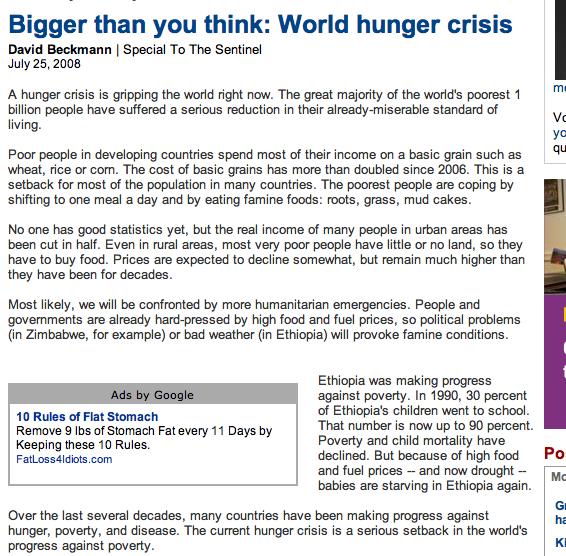I never know what to say about articles like this one from USA Today entitled, "
America's finding purpose in hopes for Africa's future," and for that reason I usually say nothing. But this one dovetails closely enough with some other things that I've been thinking through and dealing with - including looking for a new job - that I thought I would throw a few thoughts into the wind.
For starters I'm tired of being cynical. I'm really making an effort, although it's hard to tell at times, to shed the ironic cynicism that marks so much of how myself and my peers view, comment on and relate to the world. It's not profitable, it's not clever and after a while you actually start to feel as shallow and stretched thin as you sound. Not that I'm embracing naivety, and there are certainly worse things to be than naive, it's just that I want to be more sincere, more present, more charitable and I don't want to assume that there is anything special about me in doing so. Instead I want to assume that the best of me is encountering the best of you, the best of whatever, and naive or not it usually becomes quickly apparent whether or not that is true. At some point the benefit of the doubt fell out of vogue but I'm trying to bring it back - if
JT can bring sexy back why can't I do the same for sincerity.
So, all that introspection to say that there is plenty of fodder for cynicism in this article, and a number of cringe worthy statements which I will try to treat charitably. Here are a few thoughhts:
1. It's a run of the mill story looking at the movement among American's to invest themselves in the "obvious solutions" to Africa's problems. Broadly, from a sociological standpoint, I'm really interested in this movement. How new is it? Who's involved in it - from my experience it tends to be limited to middle to upper-middle class WASP's (no coincidence that this demographic makes up the bulk of Warren's congregation) and the usual disenchanted twenty-somethings - is it broader than that? Are there really more people involved in this type of charitable work than before or has globalization simply moved more of it abroad like everything else and therefore it's a bigger story?
2. Religion matters. I've said this before, although not very coherently -
here and
here. It is not coincidental that the lens through which this movement is viewed is the work of Rick Warren's
Saddleback Church. Religion as an on the ground reality that must be factored into development strategies and as a motivation for those involving themselves in relief and development work does not get the attention that it needs from the development biz. Conversely, those like Warren, involving themselves in relief and development work often do not draw heavily enough upon the experience and expertise of those who have devoted themselves to the study and practice of that work. If you can get
McCain and Obama on the same stage in your church, you have no excuse for not getting the best advise you can find in terms of planning and methodology. And maybe they are, I don't know who is running the
P.E.A.C.E. program now so I'll give them the benefit of the doubt but there are a few statements in the article that make me worry.
3. As an aside, the criticism that Warren and company should be focused on doing more "at home" is a red herring. For starters, their
local ministries out number their global programs. Second, I'm not sure people understand the scale that this church is operating on. This isn't your local parish church, this is a small city of 30,000 people. What if the Red Cross only operated charitably in America, wouldn't we wonder why they were being so stingy with their resources. Saddleback is the Red Cross of the American religious landscape, there would be something wrong if they were not working globally. As an aside within an aside, this is one of the few arguments in favor of the megachurch model that I find relevant, i.e. that they are resource rich enough to involve themselves in worthwhile projects that would otherwise be neglected.
4. The relationship between motivation and methodology. I know these people. Not personally, I've been to Warren's church and met him in an academic setting - we share an alma mater, but I know people like these people. And I like them. The way they express their faith, the life choices they have made, their politics - all of this and more I certainly have quibbles with but they tend to be genuinely good people in the sense that even the most cynical of us understand that to mean. So, when Tom Wheeler says he feels called to pour sidewalks in Kigali and in that way that he will be serving the nation of Rwanda and somehow contributing a small piece to moving it in the direction of stability, peace and prosperity I tend to believe him. Cities need sidewalks and I've never been to Kigali so I don't know how high up on the priority list they really are but at least he's a civil engineer with a specialized skill from Orange County willing to use it in the service of someone other than Walt Disney. I have trouble finding fault in him for that. I have trouble finding fault in someone who feels like they can make the world a better place. I have trouble chastising someone who feels like a smooth piece of concrete with one less pothole for an overburdened mother to watch out for on her way home is a good thing. Combining religious zeal with sound, sustainable development is hard for lots of reasons and there aren't a lot of good models out there to draw on but I think it can be done. Achieving a sustainable good for a developing country does not require a detached bureaucratic elitism.
However, there are certainly questions of methodology that need to raised. Who is profiting from this work? Are jobs being created for local laborers or are they being undercut? How will it be sustained? Is there a priority need for new sidewalks in Kigali? Again, maybe these questions and more are being asked but it is worth noting that noble motives do not lead to sound methodology any more than sound methodology engenders right motivation. All the more reason for there to be conversations and cooperation between secular and faith-based NGO's, who often fall within one camp of the other.
5. I'm sorry we didn't hear from more Rwandan voices in this piece, and I'm sorry that this is often the case in such instances - I hope it is not the case with the work that Warren is doing. In light of the long term investment that Saddleback is making in Rwanda I would hope that much of the leadership of those endeavors is in the hands of Rwandans. Again, I'm extending the benefit of the doubt here and hoping this is the case, but the truth of the matter is that it needs to be the case.
6. I would like to see more modesty from religious groups involved in relief and development work. This may be another way of saying I would like to see more realism, more admission of the harsh realities of fundamentally changing the structures that entrench poverty, hunger and war into the fabric of a society. On the one hand those who do not come from a religious background find this understandably naive. Even I, who come from a similar evangelical protestant background cringe when I read statements from Warren like, "within a few decades, Rwanda could be an oasis of prosperity — "the next Singapore." I know that
the idea is not original to Warren, but there are so many problems with that statement - simple geography for one - that I've been trying to ignore it, and hopefully someone will pull Warren aside and ask him to take it out of his talking points. The more "faith-based" language is also understandably troubling:
About 100,000 copies of The Purpose Driven Life in the Rwandan dialect have been handed out. Bradberry says that if Rwandans really hear the Gospel, they'll have no choice but to forgive each other.
That is tough for even me to swallow, and I have a profound faith in the transforming power of the gospel. Unfortunately, as unintentional as I'm sure it is, this is an example of a statement which reads more like a downplaying of genocide than
a confidence in the redemptive power of faith. Faith-based groups involved in relief and development work need to be more modest in their claims and they need to be quicker to ask for help, advise and collaboration from experts in the field - all of which I think they can do without losing the integrity of their faith, enthusiasm, zeal and presence which positions them to be bridges for development.
Ok, There is more that could be said, but I've spent (wasted?) enough time on this, there is actual work to be done.
PS - One last thing as long as I'm dispensing unsolicited advise, on the very small chance that anyone associated with Saddleback reads this post, please read between the lines of this "throw away" sentence in the article: "The move has been a shock for his kids, Hannah, 12, and Zack, 10." Make sure your training and recruitment is taking into account just how big a "shock" it can be for those who get dragged along.













